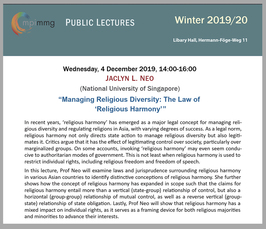"Managing Religious Diversity: The Law of ‘Religious Harmony’"
- Datum: 04.12.2019
- Uhrzeit: 14:00 - 16:00
- Vortragende(r): Jaclyn L. Neo (National University of Singapore)
- JACLYN L. NEO is Associate Professor of Law at the National University of Singapore (NUS) where she specializes in constitutional law, as well as law and religion. Her work aims to forefront Asian jurisdictions and mainstream them in comparative constitutional law. A graduate of NUS Faculty of Law and Yale Law School, Jaclyn is a recipient of multiple academic scholarships and competitive research grants. She has published in leading journals in her field, including the International Journal of Constitutional Law (I-CON) and the Oxford Journal of Law and Religion. She is the editor of Constitutional Interpretation in Singapore: Theory and Practice (Routledge, 2017) and co-editor of Pluralist Constitutions in Southeast Asia (Hart, 2019), and Regulating Religion in Asia: Norms, Modes, and Challenges (Cambridge University Press, 2019). She has also served as guest editor for the Journal of Law, Religion, and State, the Journal of International and Comparative Law, the Journal of Comparative Law, and the Singapore Academy of Law Journal. Starting 1 January 2020, she will assume the directorship of the Centre for Asian Legal Studies at NUS.
- Ort: MPI-MMG, Hermann-Föge-Weg 11, Göttingen
- Raum: Library Hall

For more details please contact adomeit(at)mmg.mpg.de.
In recent years, ‘religious harmony’ has emerged as a major legal concept for managing religious diversity and regulating religions in Asia, with varying degrees of success. As a legal norm, religious harmony not only directs state action to manage religious diversity but also legitimates it. Critics argue that it has the effect of legitimating control over society, particularly over marginalized groups. On some accounts, invoking ‘religious harmony’ may even seem conducive to authoritarian modes of government. This is not least when religious harmony is used to restrict individual rights, including religious freedom and freedom of speech.
In this lecture, Prof Neo will examine laws and jurisprudence surrounding religious harmony in various Asian countries to identify distinctive conceptions of religious harmony. She further shows how the concept of religious harmony has expanded in scope such that the claims for religious harmony entail more than a vertical (state-group) relationship of control, but also a horizontal (group-group) relationship of mutual control, as well as a reverse vertical (group-state) relationship of state obligation. Lastly, Prof Neo will show that religious harmony has a mixed impact on individual rights, as it serves as a framing device for both religious majorities and minorities to advance their interests.